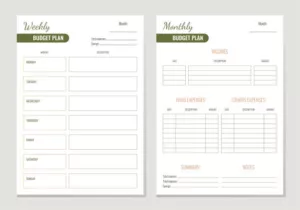Weekly Pay Jobs 2024 – Explore Exciting Opportunities with weekly pay jobs.

Are you interested in weekly pay jobs? Discover a world of employment where you’re not just building a career but enjoying the perks of weekly pay. Explore diverse job opportunities that offer financial flexibility and stability. Find your ideal job with regular payouts and take the first step towards a more rewarding work-life balance.
A weekly pay job is a type of employment arrangement where employees receive their compensation on a weekly basis. This payment frequency is characterized by the issuance of paychecks or direct deposits every week, providing a more frequent and regular flow of income for workers.
In weekly-pay jobs, employees typically receive their wages every seven days. This frequent payout cycle contrasts with other payment frequencies, such as bi-weekly or monthly.
A weekly pay job provides employees with the advantage of receiving regular paychecks, fostering financial stability, and accommodating more frequent budgeting. This structure is prevalent in various industries and is often associated with roles that involve hourly or part-time work. It offers both employers and employees a flexible and consistent approach to compensation.
Advantages of weekly payroll
These advantages highlight the positive impact that weekly payroll can have on the financial well-being and satisfaction of employees in various work arrangements.
1. Financial Stability:
– Weekly pay provides a consistent and reliable source of income, contributing to greater financial stability for employees. This regular cash flow helps individuals meet ongoing expenses with more ease.
2. Improved Budgeting:
– Employees can budget more effectively when receiving a paycheck every week. This frequency allows for better management of daily and weekly expenses, providing a clearer financial picture.
3. Faster Access to Funds:
– With weekly pay, employees have quicker access to their earnings, minimizing the time between completing work and receiving compensation. This can be especially beneficial for those with immediate financial needs.
4. Flexibility in Financial Planning:
– Weekly payroll offers greater flexibility for financial planning. Individuals can adapt their budgets more promptly based on changing circumstances or unexpected expenses.
5. Easier to Address Short-Term Needs:
– Weekly pay is advantageous for handling short-term financial needs. Whether it’s covering utility bills, groceries, or transportation costs, employees can address these expenses more effectively.
6. Timely Debt Repayment:
– Employees may find it easier to manage and repay short-term debts, such as credit card bills or loans, when they receive a paycheck every week.
7. Consistent Cash Flow:
– The weekly pay structure provides a steady and predictable cash flow for employees. This consistency allows for better planning and reduces financial stress.
8. Adaptability for Hourly Workers:
– Hourly workers, who may have varying work hours each week, benefit from weekly pay as it aligns with the nature of their employment. This ensures they are compensated promptly for the hours worked.
9. Ease of Managing Part-Time Work:
– Individuals engaged in part-time work, freelancing, or gig economy roles often appreciate weekly pay for its simplicity in managing varied work schedules and income streams.
10. Immediate Gratification:
– Weekly pay offers a sense of immediate gratification as employees see the direct results of their efforts on a weekly basis, fostering a positive connection between work and compensation.
11. Enhanced Employee Satisfaction:
– The regularity of weekly pay can contribute to higher job satisfaction as employees experience a consistent and timely reward for their contributions.
12. Facilitates Better Financial Planning:
– Employees can plan for future expenses more effectively when they have a clear understanding of their weekly earnings. This contributes to better long-term financial planning.
13. Encourages Consistent Work Performance:
– Knowing that their efforts will be rewarded on a weekly basis, employees may be motivated to maintain consistent and high-quality work performance.
14. Adaptable to Part-Time and Temporary Positions:
– For part-time or temporary positions where hours may vary, weekly pay is well-suited, providing employees with a more frequent and predictable income.
15. Ease of Adapting to Changing Circumstances:
– Weekly pay allows employees to adapt quickly to changing circumstances, such as unexpected expenses or emergencies, without significant financial strain.

Job Roles with weekly payouts
These job roles demonstrate the diversity of positions across industries that commonly adopt weekly pay arrangements, providing employees with more frequent and predictable compensation.
1. Freelancers and Independent Contractors:
– Freelancers across various industries, such as writers, graphic designers, and consultants, often receive weekly payouts for completed projects.
2. Gig Economy Workers:
– Individuals working in the gig economy, including ride-sharing drivers, food delivery couriers, and task-based freelancers, typically receive weekly compensation.
3. Retail Sales Associates:
– Sales associates in retail settings commonly receive weekly payouts for their sales performance and hourly work.
4. Restaurant Servers and Bartenders:
– Workers in the hospitality industry, such as servers and bartenders, often receive weekly pay based on their hours worked and tips earned.
5. Customer Service Representatives:
– Call center agents and customer service representatives may have weekly pay arrangements, especially in roles with hourly compensation.
6. Temporary Staffing Positions:
– Temporary or seasonal staff hired through staffing agencies often receive weekly payouts for their assigned work.
7. Construction Laborers:
– Construction workers, including laborers and tradespeople, may receive weekly compensation for their manual labor and construction projects.
8. Security Guards:
– Security personnel, including guards and officers, may receive weekly pay for their services in ensuring safety and security.
9. Transportation and Delivery Drivers:
– Drivers working for delivery services, courier companies, or ride-sharing platforms often receive weekly payouts for completed trips.
10. Fitness Instructors and Trainers:
– Part-time fitness instructors or trainers may receive weekly pay for their classes and training sessions.
11. Event and Entertainment Staff:
– Workers involved in event planning, catering, and entertainment often receive weekly compensation for their roles during events.
12. Cleaning and Janitorial Staff:
– Cleaners and janitors, both in residential and commercial settings, may receive weekly payouts for their cleaning services.
13. Warehouse Workers:
– Employees working in warehouses and logistics, including tasks like packing and shipping, may receive weekly compensation.
14. Landscapers and Gardeners:
– Workers in landscaping and gardening services may receive weekly pay for their outdoor maintenance work.
15. Healthcare Support Roles:
– Certain healthcare support positions, like nursing assistants and medical receptionists, may offer weekly pay for their services.
16. Educational Assistants:
– Part-time educational assistants, including teaching assistants and tutors, may receive weekly compensation for their support roles.
17. IT Support (Contractors):
– IT support professionals working on a contractual or project basis may receive weekly payouts for their services.
18. Real Estate Property Managers:
– Employees in property management, handling tasks like maintenance and leasing, may find weekly pay structures.

READ ALSO: Odd Job Apps 2024 – Explore the Best Odd Jobs App for Flexible Gigs.
Navigating the Gig economy
Navigating the gig economy involves understanding the dynamics of short-term, flexible work arrangements. Here are key insights and strategies to navigate the gig economy successfully:
1. Diversify Your Skills:
– The gig economy thrives on versatility. Consider acquiring a diverse set of skills that align with in-demand gig opportunities. This flexibility can enhance your marketability in various gig platforms.
2. Research Gig Platforms:
– Explore and research different gig platforms to find the ones that align with your skills and preferences. Each platform may cater to specific industries or types of services.
3. Build a Strong Online Presence:
– Establish a robust online presence, including a well-crafted resume or portfolio on gig platforms. Highlight your skills, experience, and any relevant certifications to attract potential clients.
4. Read Reviews and Ratings:
– Before engaging with a gig platform or client, read reviews and ratings from other freelancers. This provides insights into the credibility and reliability of the platform or client.
5. Set Clear Goals and Boundaries:
– Define your goals and boundaries in terms of the type of work you want, acceptable pay rates, and the number of hours you’re willing to commit. Setting clear parameters helps you make informed decisions.
6. Understand Tax Implications:
– Gig workers are often considered independent contractors, which has tax implications. Familiarize yourself with tax regulations for freelancers, including deductions and reporting requirements.
7. Network and Collaborate:
– Networking is crucial in the gig economy. Connect with other freelancers, attend industry events, and collaborate on projects. Networking can lead to referrals and new opportunities.
8. Create a Financial Safety Net:
– Gig income can be variable, so it’s essential to create a financial safety net. Save a portion of your earnings for taxes, emergencies, and periods when work may be slow.
9. Stay Updated on Industry Trends:
– The gig economy evolves, and staying informed about industry trends, emerging technologies, and changing demand can help you position yourself effectively.
10. Prioritize Work-Life Balance:
– With the flexibility of gig work comes the responsibility to maintain a healthy work-life balance. Set clear working hours, take breaks, and avoid burnout.
11. Negotiate Fair Rates:
– Understand your market value and negotiate fair rates for your services. Don’t undervalue your skills, and be prepared to communicate the value you bring to clients.
12. Continuously Learn and Upskill:
– The gig economy rewards those who adapt. Invest in continuous learning and upskilling to stay competitive in your chosen field.
13. Seek Client Feedback:
– Request feedback from clients after completing gigs. Positive feedback can enhance your reputation, while constructive criticism provides opportunities for improvement.
14. Be Mindful of Contracts and Agreements:
– Review contracts and agreements carefully before accepting gigs. Ensure you understand the terms, including payment terms, deliverables, and any exclusivity clauses.
15. Plan for Retirement and Benefits:
– Gig workers often lack traditional employee benefits. Consider planning for retirement by exploring options like individual retirement accounts (IRAs) and securing health insurance independently.
Finding employers who offer weekly pay
Finding reliable employers who adhere to weekly pay can involve targeted strategies to identify trustworthy opportunities. Here are steps to help you find such employers:
1. Research Established Platforms:
– Explore well-established gig platforms and job boards known for their reliability. Platforms like Upwork, Freelancer, and Fiverr often have a variety of gigs with different payment schedules, including weekly payouts.
2. Read Reviews and Testimonials:
– Look for platforms or employers with positive reviews and testimonials from freelancers. This can provide insights into the reliability of the payment process and the overall experience of working with a particular employer.
3. Network with Freelancers:
– Connect with other freelancers in your industry through online forums, social media groups, or networking events. Experienced freelancers often share information about reliable employers who offer weekly pay.
4. Check Payment Policies:
– Review the payment policies of potential employers or platforms. Legitimate employers typically have transparent payment policies outlined in their terms of service. Be cautious if payment details are unclear or ambiguous.
5. Utilize Freelancer Communities:
– Join online communities or forums specifically dedicated to freelancers. These platforms often share information about trustworthy employers, payment practices, and potential red flags to be aware of.
6. Explore Industry-Specific Platforms:
– Depending on your industry, there may be niche platforms that cater to specific types of freelancers. Explore platforms that align with your skills and preferences, as these may offer weekly pay options.
7. Ask for References:
– When engaging with a potential client or employer, don’t hesitate to ask for references from other freelancers who have worked with them. Reliable employers should be willing to provide references to build trust.
8. Utilize Freelancer Payment Protection:
– Some platforms offer payment protection for freelancers, ensuring that you receive payment for completed work. Research platforms with built-in safeguards to enhance the security of your payments.
9. Review Employer Profiles:
– On gig platforms, thoroughly review the profiles of potential employers. Look for employers with complete profiles, positive ratings, and a history of successful collaborations with freelancers.
10. Join Freelancer Associations:
– Consider joining freelancer associations or organizations related to your industry. These groups may provide resources, recommendations, and insights into employers known for reliable payment practices.
11. Evaluate Communication:
– Assess the communication style of potential employers during the hiring process. Clear and transparent communication about payment schedules and expectations is a positive sign.
12. Use Escrow Services:
– Platforms that offer escrow services can add an extra layer of security. Payments are held in escrow until both parties fulfill their obligations, reducing the risk of non-payment.

Budgeting strategies for weekly income
Budgeting on a weekly income requires a more frequent and detailed approach. Here are effective budgeting strategies tailored for a weekly pay schedule:
1. Create a Weekly Budget:
– Break down your monthly expenses into weekly segments. Categorize expenditures such as rent or mortgage, utilities, groceries, transportation, and discretionary spending on a weekly basis.
2. List Fixed and Variable Expenses:
– Differentiate between fixed expenses (unchanging) and variable expenses (fluctuating). Fixed expenses might include rent or mortgage, while variable expenses may include groceries and entertainment.
3. Prioritize Essentials:
– Identify essential expenses that must be covered each week, such as housing, utilities, and groceries. Prioritize these to ensure critical needs are met first.
4. Allocate for Savings:
– Allocate a portion of your weekly income to savings. Even a small amount set aside each week can accumulate over time and provide a financial safety net.
5. Emergency Fund:
– Aim to build an emergency fund to cover unexpected expenses. Contribute a portion of your weekly income to this fund to enhance your financial resilience.
6. Use Envelopes or Digital Categories:
– Consider using the envelope method or digital budgeting apps to allocate cash or virtual “envelopes” for each spending category. This helps you visually track and control your spending.
7. Limit Discretionary Spending:
– Be mindful of discretionary spending on non-essential items. Set a weekly limit for discretionary expenses like dining out or entertainment to avoid overspending.
8. Review and Adjust:
– Regularly review your budget to ensure it aligns with your financial goals. If necessary, make adjustments based on changes in income or unexpected expenses.
9. Automate Savings:
– Set up automatic transfers to your savings account. This ensures that a portion of your income is consistently saved without the need for manual transfers.
10. Pay Bills Strategically:
– Schedule bill payments strategically throughout the month. If certain bills are due mid-month, allocate funds accordingly from your weekly income.
11. Plan for Irregular Expenses:
– Anticipate irregular expenses, such as quarterly or annual bills, and allocate a portion of your weekly income to cover these costs when they arise.
12. Track Every Expense:
– Keep meticulous records of your spending. Whether through a budgeting app or a simple spreadsheet, tracking every expense helps you stay accountable and identify areas for improvement.
13. Set Financial Goals:
– Define short-term and long-term financial goals. Allocate a portion of your weekly income toward these goals, whether it’s paying off debt, saving for a vacation, or investing.
14. Adjust for Fluctuating Income:
– If your income varies from week to week, create a budget that accounts for these fluctuations. Consider building flexibility into your budget to accommodate variations in income.
15. Regularly Assess Your Progress:
– Conduct regular check-ins to assess your budgeting progress. Celebrate achievements and adjust your strategy as needed to stay on track.
By implementing these budgeting strategies tailored to a weekly income, you can effectively manage your finances, build savings, and work toward your financial goals.
Job search platforms for weekly pay jobs
When looking for jobs with weekly pay, consider exploring the following job search platforms known for featuring opportunities with weekly or frequent pay schedules:
1. Snagajob:
– Snagajob specializes in hourly and part-time jobs, and many positions listed on the platform offer weekly pay.
2. Indeed:
– Indeed is a widely used job search platform where you can find a variety of jobs. Use the search filters to specify your preference for weekly pay.
3. Glassdoor:
– Glassdoor not only provides job listings but also offers insights into company reviews and salaries. Some employers specify their pay frequency in job postings.
4. SimplyHired:
– Similar to Indeed, SimplyHired aggregates job listings from various sources. Use filters to narrow down your search to positions that pay on a weekly basis.
5. CareerBuilder:
– CareerBuilder is a comprehensive job platform where you can find various types of jobs. Some employers may specify their pay frequency in job postings.
6. Monster:
– Monster is another well-known job search platform that covers a wide range of industries. You can filter job search results based on pay frequency.
7. Craigslist:
– While Craigslist is known for local classifieds, it also has a job section where you can find gigs and part-time work, including some that offer weekly pay.
8. Freelancer Platforms (Upwork, Fiverr, Freelancer.com):
– Freelancer platforms often have short-term gigs and projects. Many freelancers on these platforms receive payment upon project completion, which can result in weekly pay.
9. Staffing Agencies:
– Explore staffing agencies in your area. Some temporary or contract positions sourced through staffing agencies may offer weekly pay.
10. ZipRecruiter:
– ZipRecruiter is an online employment marketplace that connects employers with job seekers. Some postings on ZipRecruiter indicate the frequency of pay.
11. Care.com (for Caregivers):
– If you’re interested in caregiving or pet care roles, Care.com often features jobs in these areas with varying pay frequencies, including weekly.
12. Local Job Boards:
– Check local job boards or community forums. Sometimes small businesses or local employers may advertise positions with weekly pay on these platforms.
Negotiating pay frequency
Negotiating pay frequency can be a crucial aspect of your compensation discussions with an employer. Here are some tips on how to approach negotiating pay frequency:
1. Understand Standard Practices:
– Before negotiating, research standard pay frequencies in your industry and region. Knowing common practices will help you make a more informed request.
2. Assess Personal Financial Needs:
– Consider your own financial situation and preferences. If you have specific financial obligations or preferences for managing your budget, communicate these factors during negotiations.
3. Timing Matters:
– Bring up the topic of pay frequency at an appropriate time during the negotiation process. Ideally, this should be after the employer has shown interest in hiring you but before you’ve formally accepted the offer.
4. Emphasize Your Value:
– Clearly articulate your skills, experience, and the value you bring to the role. Frame the discussion in a way that highlights how the requested pay frequency aligns with your commitment and performance.
5. Express Flexibility:
– Demonstrate flexibility in your negotiation. If weekly pay is not a common practice for the employer, express your willingness to explore alternatives, such as bi-weekly or semi-monthly pay, while still emphasizing your preference for weekly pay.
6. Provide Rationale:
– Offer a rationale for your preferred pay frequency. Explain how a weekly pay schedule can contribute to your financial stability and help you better manage your expenses.
7. Highlight Industry Standards:
– If weekly pay is a common practice in your industry, reference this during negotiations. Highlighting industry standards can lend credibility to your request.
8. Be Open to Compromise:
– Negotiation is a two-way street. Be open to compromise and explore middle-ground solutions. This could involve agreeing to a different pay frequency or discussing the possibility of reassessing the pay frequency after a probationary period.
9. Consider Benefits Package:
– If the employer is hesitant about changing the pay frequency, consider negotiating other aspects of the benefits package. This could include additional vacation days, remote work options, or professional development opportunities.
10. Get It in Writing:
– Once an agreement is reached, ensure that the agreed-upon pay frequency is clearly outlined in your employment contract or offer letter. Having it in writing provides clarity and avoids misunderstandings.
11. Maintain Professionalism:
– Approach the negotiation with professionalism and respect. Be clear about your needs but avoid being confrontational. A collaborative and respectful tone can contribute to a positive outcome.
Understanding payroll cycles
Payroll cycles refer to the recurring schedule on which employees are paid their wages or salaries. Understanding payroll cycles is essential for both employers and employees to ensure accurate and timely compensation. Here are key points to consider:
1. Frequency of Pay:
– Payroll cycles can vary in frequency. Common cycles include weekly, bi-weekly (every two weeks), semi-monthly (twice a month), and monthly. The choice of frequency often depends on company policies and industry standards.
2. Weekly Payroll:
– In a weekly payroll cycle, employees receive their wages every week. This frequency provides a more frequent cash flow for employees but may require more administrative effort from the payroll department.
3. Bi-Weekly Payroll:
– Bi-weekly payroll cycles occur every two weeks, resulting in 26 pay periods per year. This cycle is common and aligns with the calendar weeks, making it simpler to manage for both employers and employees.
4. Semi-Monthly Payroll:
– In a semi-monthly payroll cycle, employees are paid twice a month, usually on specific dates such as the 15th and the last day of the month. This results in 24 pay periods per year.
5. Monthly Payroll:
– Monthly payroll cycles involve paying employees once a month. This cycle can simplify payroll processing but may present challenges for employees managing monthly budgeting.
6. Payroll Processing Dates:
– Employers set specific payroll processing dates within each cycle. These dates determine when timecards, hours worked, and other relevant payroll information must be submitted to ensure accurate and timely payments.
7. Cut-Off Dates:
– Payroll cut-off dates are the deadlines by which employees must submit any relevant information, such as timesheets or leave requests, to be included in the upcoming payroll cycle.
8. Direct Deposit and Paper Checks:
– Payroll cycles also dictate when direct deposits or paper checks are issued. Direct deposit is a common method that provides employees with quicker access to their funds.
9. Tax Withholdings:
– Tax withholdings, including federal and state income taxes, as well as other deductions like Social Security and Medicare, are processed in alignment with the chosen payroll cycle.
10. Compliance with Labor Laws:
– Employers must comply with labor laws regarding payroll cycles. Regulations may vary, and employers are responsible for ensuring that pay frequency aligns with legal requirements.
11. Communication:
– Employers should communicate the chosen payroll cycle clearly to employees. This includes providing information about pay dates, cut-off dates, and any relevant payroll policies.
12. Flexibility:
– Some companies offer flexibility in pay frequency to accommodate different employee needs. For example, allowing employees to choose between monthly or bi-weekly pay cycles.
Understanding the payroll cycle is crucial for employees to effectively manage their finances and for employers to ensure compliance with labor regulations. Clear communication and adherence to set schedules contribute to a smooth payroll process for everyone involved.
Frequently asked questions
What is a weekly pay job?
– A weekly pay job is a position in which employees receive their wages or salary on a weekly basis. This means that employees are paid every week for the work they performed during that week.
How does weekly pay differ from other pay frequencies?
– Weekly pay differs from other pay frequencies, such as bi-weekly, semi-monthly, and monthly, in the frequency of payment. With weekly pay, employees receive their earnings every week.
Which industries commonly offer weekly pay jobs?
– Weekly pay jobs can be found across various industries. However, they are more common in industries with frequent or seasonal employment needs, such as retail, hospitality, and certain types of temporary or gig work.
Are weekly pay jobs typically part-time or full-time positions?
– Weekly pay jobs can be either part-time or full-time positions. The pay frequency is not necessarily tied to the nature of employment but is often determined by the employer’s payroll schedule.
How do I find weekly pay jobs?
– You can find weekly pay jobs through job search platforms, company websites, and staffing agencies. When searching for jobs, look for positions that explicitly mention a weekly pay schedule.
Are all hourly jobs paid on a weekly basis?
– Not all hourly jobs are paid weekly. The pay frequency depends on the employer’s policies. While hourly positions are common in jobs with weekly pay, there are also hourly jobs with different pay frequencies.
Can I negotiate for weekly pay if the job initially offers a different pay frequency?
– You can negotiate for weekly pay, but it depends on the employer’s payroll policies. It’s advisable to discuss your preference during salary negotiations and see if an arrangement can be made that aligns with your needs.
Are there any disadvantages to weekly pay?
– Weekly pay can have advantages and disadvantages. While it provides more frequent access to funds, it may also require additional administrative effort for both employers and employees. Additionally, managing budgeting on a weekly basis can be challenging for some individuals.
How do taxes work with weekly pay?
– Taxes are typically withheld based on the annual salary or hourly rate. The frequency of pay doesn’t impact the overall tax liability. The withholding amounts are prorated based on the pay frequency.
Can I change the pay frequency once I start a job?
– Changing the pay frequency depends on the employer’s policies. Some companies may have set payroll schedules, while others may offer flexibility. It’s advisable to discuss any preferences or concerns about pay frequency before accepting a job offer.
Conclusion
Weekly pay jobs offer a unique approach to compensation that aligns with the evolving needs and preferences of the modern workforce. The frequency of pay is a fundamental aspect of the employer-employee relationship, impacting financial stability and overall job satisfaction.
For job seekers, the appeal of weekly pay lies in more frequent access to earnings, providing a potential solution for those seeking a steady and consistent income flow. This can be particularly beneficial for individuals managing tight budgets or financial obligations on a weekly basis.
Employers, in turn, benefit from the flexibility of pay frequencies, allowing them to tailor compensation structures to meet the diverse needs of their workforce. While weekly pay may present administrative challenges, its advantages in attracting and retaining talent should not be overlooked.
As the employment landscape continues to adapt to changing expectations, the availability of weekly pay options reflects a commitment to fostering positive working relationships. The discussion around pay frequencies underscores the importance of communication and flexibility in meeting the financial preferences of both employers and employees.
In short, weekly pay jobs contribute to a dynamic and responsive approach to compensation, striving to create mutually beneficial arrangements that enhance the overall well-being of the workforce.




